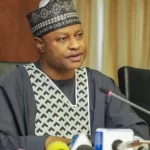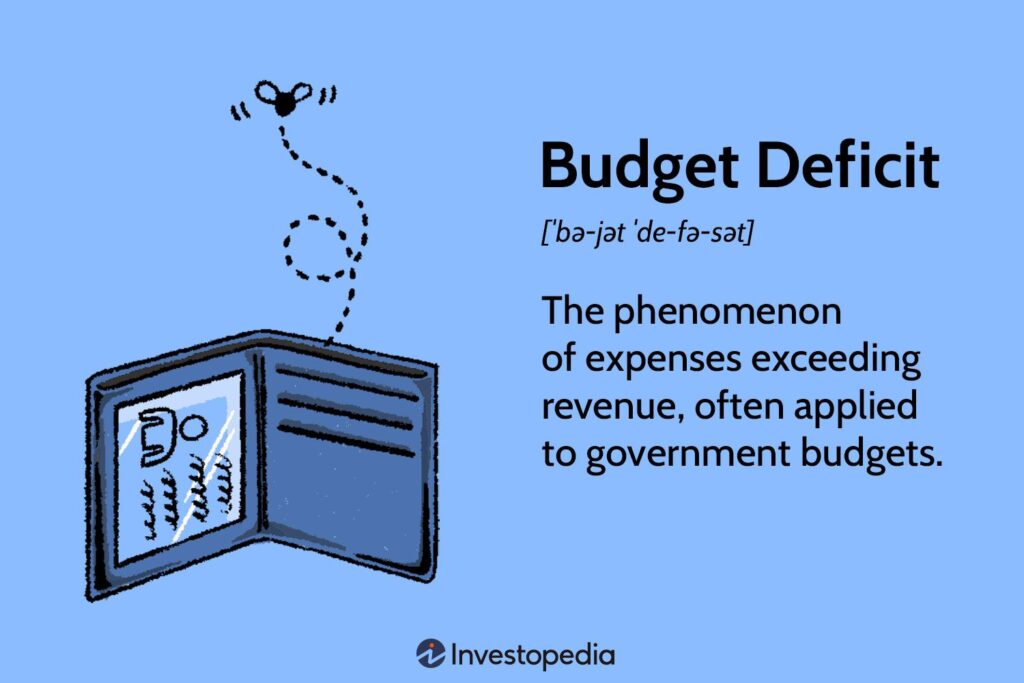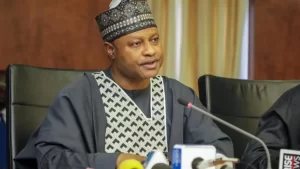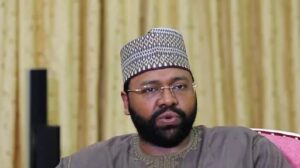Budget deficits attained an unprecedented level under former President Buhari’s administration. From N2.41 trillion in 2016 to N12.1 trillion in 2023, analysts estimate the total budget deficit under the last administration to be about N47.43 trillion, based on data from the Budget Office of the federation. The country’s budget deficit to GDP ratio had risen from 1.69 per cent in 2015 to 2.37 per cent in 2016. It increased to 2.85 per cent in 2018, 2.92 per cent of GDP in 2019. Furthermore, the fiscal deficit was estimated at 5.0 percent of GDP in 2022 and 4.3 percent in 2023.
According to reports, this deficit financing has been largely financed by government borrowing. The budget implementation report indicated that the federal government raised short-term credit from the Central Bank of Nigeria (CBN) through the mechanism of Ways and Means subject to a ceiling of 12.5 per cent of federal government’s revenue.
Fiscal deficits are negative balances that arise whenever a government spends more money than it brings in during the fiscal year. This imbalance sometimes called the current accounts deficit or the budget deficit is common among contemporary governments all over the world. Budget deficits may occur as a way to respond to certain unanticipated events and policies, such as the increase in defense spending during crisis. In fact, budget deficits affect individuals, businesses, and the overall economy.
A government runs a fiscal deficit when, for a specific period, it spends more money than it takes in from taxes and other revenues; this gap between income and spending is subsequently closed by government borrowing, increasing the national debt; an increase in the fiscal deficit, in theory, can boost a sluggish economy by giving more money to people who can then buy and invest more; and long-term deficits, however, can be detrimental for economic growth and stability.
Economists and policy analysts disagree about the impact of fiscal deficits on the economy. Some, such as Nobel laureate Paul Krugman, suggest that the government does not spend enough money. Others argue that budget deficits crowd out private borrowing, manipulate capital structures and interest rates, decrease net exports, and lead to either higher taxes, higher inflation or both.
Until the early 20th century, most economists and government advisers favored balanced budgets or budget surpluses. Then, the Keynesian revolution and the rise of demand-driven macroeconomics made it politically feasible for governments to spend more than they fetched.
Governments could borrow money and increase spending as part of a targeted fiscal policy. Keynes rejected the idea that the economy would return to a natural state of equilibrium on its own. Instead, he argued that once an economic downturn set in, for whatever reason, the fear and gloom that it engenders among businesses and investors would tend to become self-fulfilling. That, it turn, could lead to a sustained period of depressed economic activity and unemployment. As a result, Keynes advocated a countercyclical fiscal policy during periods of economic woe. During such times, the government should undertake deficit spending to make up for the decline in investment and boost consumer spending in order to stabilize aggregate demand.
Nevertheless, an empirical study conducted by A.D. Umaru, H.M. Aliero and M. Abubakar published in CBN Economic and Financial Review (2021) analyzed the relationship between budget deficit and economic growth in Nigeria The analysis showed that though budget deficit induces economic growth in Nigeria, such inducement will only be meaningful when the deficit is below 2.02 per cent of the GDP. This positive relationship holds only if the deficit to GDP ratio is below the estimated threshold value. Hence, the optimal threshold of 2.02 per cent gives the government and its policymakers a clear signal on when to stop financing budget deficit. In this regard, the World Bank has expressed concern that Nigeria’s fiscal deficits in recent time have breached the stipulated limit for federal fiscal deficit of 3 percent. In addition, we recall that the former Coordinating Minister for the Economy and Minister of Finance, Dr Ngozi Okonjo-Iweala, had warned the last administration that there is a need to keep the budget deficit under three per cent of GDP because of the Fiscal Responsibility Act, 2007, and in accordance with the international norm.
The Nigerian economy is projected to grow by an average of 2.9 percent per year between 2023 and 2025, only slightly above the population growth rate of 2.4 percent. Growth will be driven by services, trade, and manufacturing. Oil production is projected to remain subdued in part because of inefficiencies and insecurity. With Nigeria’s population growth continuing to outpace poverty reduction, and persistent high inflation, the number of Nigerians living below the national poverty line will rise by 13 million between 2019 and 2025 in the baseline projection. Besides, the World Bank, in its report on Macro Poverty Outlook for Nigeria, released in April 2023, indicated that Nigeria spent 96.3 per cent of its 2022 revenue on servicing its debts.
Also, it was recently reported that the federal government borrowed N6.31trillion from the CBN through Ways and Means Advances in 10 months of 2022; which pushed total borrowing from the CBN from N17.46 trillion in December 2021 to N23.77 trillion in October 2022. And World Bank had raised concerns over the financing of budget deficit through the CBN’s Ways and Means. According to the global bank, financing of fiscal deficit through Ways and Means continues to fuel inflation by increasing liquidity in the money market.
Therefore, since Nigeria’s budget deficit in recent years has breached the international standard as well as the legally stipulated level set in the Fiscal Responsibility Act (2007), it is high time the federal government curtailed its deficit financing; especially because of its poor impact on our gross domestic product, and rising public debt profile and inflation.
Gross Domestic Product (GDP)
Despite about 402 percent increase in budget deficit over the last seven years, the gross domestic product GDP) have remained sluggish growing at an average of about 1.12 percent. Moreover, a breakdown of some of the expenses revealed that the immediate past administration had spent at least N23.66 trillion on personnel costs, pensions, overhead costs, presidential amnesty programme, other service-wide votes, and special interventions; while a minimum of N14.13 trillion was spent servicing domestic and foreign debts.
Public Debt Stock
Nigeria’s total public debt stock, consisting of the domestic and external debt stocks of the federal government, 36 state governments and the Federal Capital Territory was N46.25 trillion (USD103.11 billion) at the end of December 2022. This is a 14.46 percent increase compared to N39.56 trillion (USD95.77 billion) recorded on December 31, 2021. According to a report from the Debt Management Office, in terms of composition, total domestic debt stock was N27.55 trillion (USD 61.42 billion); while total external debt stock was N18.70 trillion (USD 41.69 billion). Amongst the reasons for the increase in the total public debt stock were new borrowings by the federal government and sub-national governments, primarily to fund Budget Deficits. Also, there is about $16.62bn Eurobond loan repayments which will be made almost every year until about 2038. The breakdown showed that repayment of $500m is expected in 2023 and $1.12bn in 2025. The other payments include $1.5bn in 2027 and $1.25bn each year from 2028 to 2030.
Inflation
In the recent data published by National Bureau of Statistics (NBS), Nigeria’s annual inflation rate accelerated for the fifth month to 22.22% in April 2023 , reaching a nearly 18-year high and following 22.04% in the prior month. In addition, we note that CBN’s inflation target of single digit, which has not been achieved since 2016, remains unlikely to be met in the near term.
Strategies to Reduce Budget Deficits
The federal and state governments can counter budget deficits by promoting economic growth through fiscal policies, such as reducing government spending and increasing taxes. Determining the best strategies regarding which spending to cut or whose taxes to raise are often widely debated. However, we suggest the following measures which, when put in place, could help to reduce high cost of governance:
- Ministries, Departments and Agencies performing similar functions should be merged.
- Political offices should be made less attractive.
- Expend borrowed funds on productive ventures
- Provision of adequate Infrastructure.
- Enforcing the Monetization Policy of Government
- Stop medical tourism for all elected and appointed political officers
- Stop sponsoring Christian and Moslem Pilgrimages.
There must be a deliberate and focused effort at curtailing excessive spending in all public institutions. The best time to do that was yesterday, the next best time is today. Else, we will be sinking deeper into debt, poverty and anomie.









More Stories
FG has supported Naira with $8 billion, says Rewane
NNPC vs Dangote: Mele Kyari says security action taken against petrol reviewer
NBS latest data shows food inflation crashed by nearly 40%